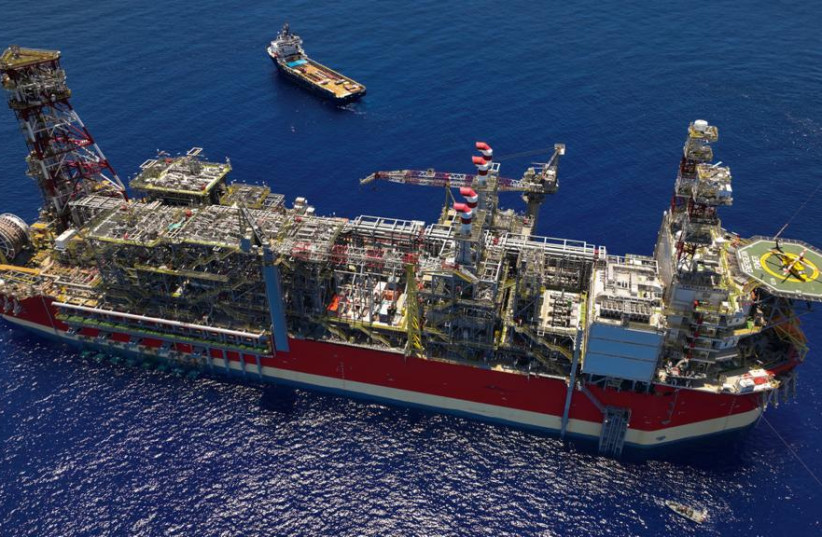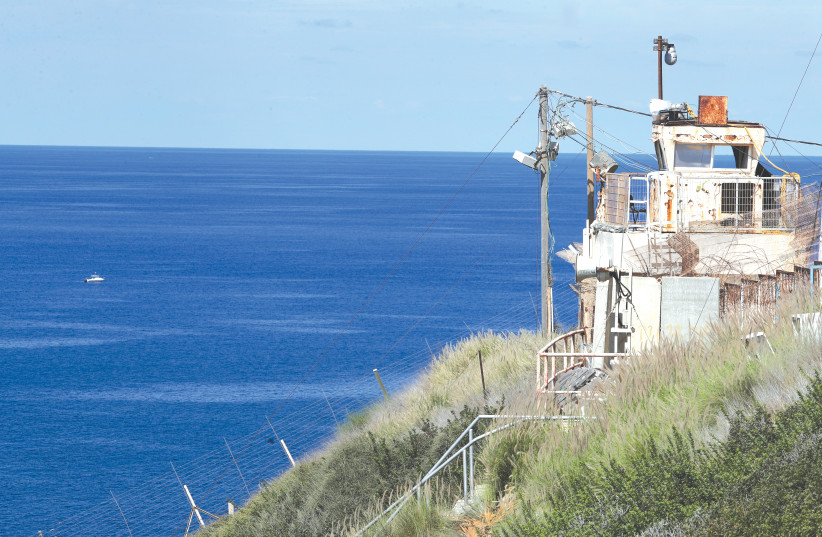Qatar’s state-run energy company has entered a consortium to explore for gas offshore of Lebanon, according to reports.
This will mean that Qatar will potentially be involved in developing infrastructure and resources close to Israel’s border, a move made possible by the pressure put on Israel to sign a maritime deal last year with Lebanon.
US mediator and energy envoy Amos Hochstein praised the developments this week, tweeting “congratulations to Lebanon on Qatar energy joining as investor with Eni [and] TotalEnergies. Welcome additional new investment in Lebanon energy sector and another example of progress from the maritime agreement.”
Hochstein tagged Lebanon’s Prime Minister Najib Mikati and the US Embassy in Beirut.
The Chairman and CEO of Total also tweeted about the agreement, writing, “great day in Beirut with Prime Minister Najib Mikati, Minister Walif Fayad, Saad Kaabi of QatarEnergy and Claudio Descalzi of Eni to celebrate the new exploration momentum made possible by the historic delineation of the maritime border between Lebanon and Israel.”

The timing does not appear coincidental
The context here is important. Days before Israel agreed to the maritime deal last year, Hezbollah was threatening a war if Israel didn’t come to the table. Back in early October of 2022, Israel was forced to prepare for escalation in the north if the deal wasn’t signed. The deal basically gives Lebanon what it demanded and Hezbollah was clearly sitting on the sidelines threatening Israel with war if a deal wasn’t made.
In July 2022, Hezbollah had flown drones toward a gas rig off the coast of Israel, a clear threat to Israel’s energy exploration. When Israel signed the deal with Lebanon, the country was on the eve of elections, but the public was told that the deal had to be done immediately. Prime Minister Benjamin Netanyahu had critiqued the deal at the time but has not appeared to make moves about it since.
On the one hand, the consortium that is coming together is European companies, including Total and Eni. France, which ran Lebanon for 20 years after the World War I, has deep historical and cultural ties and it is, therefore, natural that Total would play a role in Lebanon with French President Emmanuel Macron expressing support for Total’s role last year.
Reuters also reported last year that “a senior Israeli official was in Paris on Monday for talks with TotalEnergies SE about potential future profit-sharing from exploration by the company in a natural gas field off Israel and Lebanon.” Total and Eni had been reported to be involved with Lebanon’s block 4 and block 9, which borders Israel’s maritime blocks, off the coast. Reuters has said that Total was looking to do an assessment off the coast this spring with drilling to potentially begin in the third quarter of this year.
On Monday, AFP reported that Lebanon had said Qatar had entered the consortium.
“Lebanese Energy Minister Walid Fayad and his Qatari counterpart Saad al-Kaabi, who is also QatarEnergy's chief executive, signed the deal Sunday, along with the Eni and TotalEnergies chief,” Al-Monitor noted.
The AFP report notes that the agreement will lead to the exploration of part of the Qana field off the coast of Sidon.
“Sunday's deal will see the gas-rich Gulf country's state-run QatarEnergy receive a minority 30 percent stake in two blocks of Lebanon's exclusive economic zone, according to Lebanese caretaker Prime Minister Najib Mikati,” the report said. “French company TotalEnergies and Italy's Eni will both retain 35 percent shares in the blocks after Russia's Novatek relinquished its minority stake in 2022.”

Qatar has said this is an opportunity to support Lebanon’s economic development. Lebanon is in the midst of an economic crisis.
Ostensibly the agreement with Israel means Israel will receive 17 percent of proceeds from finds at Qana, according to the AFP report. The report also says this is a game changer for Lebanon with Qatar entering into the field. An energy consultant was quoted as saying that Lebanon will need the infrastructure now to export the gas. This could mean a pipeline.
It’s important to see this development as more than the sum of its parts. Gas deals in the Eastern Mediterranean are not just about gas or profits; they are about politics and foreign affairs. For instance, Turkey entered a maritime agreement with the embattled government of Libya back in 2019. Libya is divided, and at the time, Egypt and others were backing the eastern Libya forces of Khalifa Haftar. Turkey swooped in and made an agreement that would put Turkey astride Greek rights to the Mediterranean. This would also potentially cut off any kind of East Med pipeline Israel, Greece and Cyprus were interested in.
Soon after the Turkish agreement, Turkish forces and drones were sent to Libya. Similarly, Turkey is in talks with Russia to be a gas hub and Ankara has reconciled with Israel, hoping to redirect Israeli trade via Turkey. Ankara is also a close ally of Doha. It’s not clear if this could mean that Turkey is closely watching the developments off Lebanon, but it’s plausible that this is the case. Turkey is also considering reconciliation with Syria’s regime and has been talking with Moscow and Iran.
Meanwhile, there are energy deals in the works between Syria and Egypt, via Jordan. Last year deals were signed that were supposed to see Egypt provide Syria with electricity via Jordan and see Egyptian gas go to Lebanon via Syria as well.
Qatar’s role in Lebanon matters also because Iran backs Hezbollah who controls southern Lebanon. In December, Hezbollah members murdered an Irish UN peacekeeper in southern Lebanon when his convoy strayed from a major thoroughfare. Any energy companies doing work in southern Lebanon will be monitored by Hezbollah and the fate of the UN soldier will clearly loom large. Qatar’s foreign minister met with Iran’s foreign minister this week. The countries have amicable ties and Iran backs Hezbollah. It’s plausible that Iran and Hezbollah will view Qatar’s entry into the area in a positive light.
On the one hand, this could be seen as a bunch of ships all moving in the right direction toward regional integration and stability. Here are Egypt, Jordan and Syria working with Lebanon while Turkey talks to Russia, Iran and Syria and Qatar invests while Israel and Lebanon have a maritime deal; therefore everyone is connected. One theory of economic peace would argue that when economies are connected there is less chance for war and escalation.
What can be the downsides to this?
However, on the other side of the coin, there are potential pitfalls. Israel has partners in the Gulf, such as the UAE and Bahrain, and the Negev forum brings together Israel and more partners such as Egypt. However, countries such as the UAE, Bahrain and Saudi Arabia would be unlikely to invest in Lebanon these days because of Hezbollah. Saudi Arabia once brokered the Taif agreement in 1989 to end the Lebanese Civil War and played a key role in Lebanon.
However, in the last decade and a half, Hezbollah has engineered a way of blocking its adversaries from power in Lebanon, bringing Michel Aoun to power and creating power vacuums in Lebanon. Today there is no president of Lebanon because of Hezbollah.
Qatar is stepping into the vacuum and Doha likes these kinds of vacuums. Qatar played a key role in hosting the Taliban and bringing them back to power, and it has hosted Hamas and sent financial support to Gaza. The support for Gaza is also seen as stabilizing Gaza, but Qatar’s long-term goal may not just be stability in the Gaza Strip but to support Hamas coming back to power. Turkey, whose ruling party is rooted in the Muslim Brotherhood, may be interested in this as well. That means that Qatar may see a lot more return on investment in Lebanon than just an energy deal. It could be thinking long-term.
Considering the fact Hezbollah recently murdered an Irish peacekeeper, its nefarious role in the Beirut port explosion of 2020 and its assassination of former Lebanese Prime Minister Rafic Hariri, as well as its attack on Israel in the 2006 war, it’s unclear where Hezbollah’s next move might be or what Iran will do in this scenario.
The US-backed maritime agreement locks Israel into supporting the agreement and energy deals, but if Iran-backed Hezbollah tries to benefit on the side, or continue to threaten Israel, will it be able to use the presence of companies off the coast as a potential shield to opposition to its activities?
These are key questions that may come up in the future since Lebanon is not a normal country; it is financially hollowed out, a terror army militia (Hezbollah) controls part of it and it lacks a president and working government. In such conditions, major energy investment is a complex matter.
